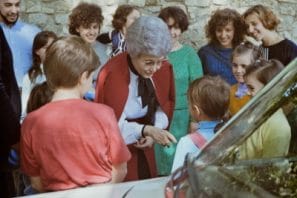
Dec 30, 2016 | Focolare Worldwide, Senza categoria
Download brochure with program Streaming event 11 March, 16:00-18:30 (CET, UTC+1)
A path o f life and thought to be shared throughout the year, at all latitudes. 50 years after its founding, there will be, in 2017 various local events and initiatives in various countries worldwide. A roadmap of life and thought in various phases will highlight the anthropological and universal value of the family in the perspective of “universal brotherhood,” and testify to the richness of social and cultural diversity, together with the ideal of unity concretised in family life. The central event will be held in Loppiano from 10 -12 March 2017. About 800 people from all over the world are expected to attend. The families will immerse themselves fully in the reality of the international town of the Focolare, and bear witness to Chiara’s dream in all the continents. In the morning there will be workshops for adults, youth, teenagers and children, held in collaboration with the parish movement, the gen3 and gen4 centres, the no-profit AFN and AMU. In the afternoon the meeting in the Auditorium will be aired via live streaming and will highlight the experts of family themes, who will be participating in the Cultural Seminar to be held at the Sophia University (10 -11 March 2017). This seminar with its characteristic universal outlook will give rise to the future Study Center on the family, with the objective of enhancing the contribution of the spirituality of unity to the family in the challenges it has to face today. For information: www.famiglienuove.org famiglienuove@dev.focolare.org
f life and thought to be shared throughout the year, at all latitudes. 50 years after its founding, there will be, in 2017 various local events and initiatives in various countries worldwide. A roadmap of life and thought in various phases will highlight the anthropological and universal value of the family in the perspective of “universal brotherhood,” and testify to the richness of social and cultural diversity, together with the ideal of unity concretised in family life. The central event will be held in Loppiano from 10 -12 March 2017. About 800 people from all over the world are expected to attend. The families will immerse themselves fully in the reality of the international town of the Focolare, and bear witness to Chiara’s dream in all the continents. In the morning there will be workshops for adults, youth, teenagers and children, held in collaboration with the parish movement, the gen3 and gen4 centres, the no-profit AFN and AMU. In the afternoon the meeting in the Auditorium will be aired via live streaming and will highlight the experts of family themes, who will be participating in the Cultural Seminar to be held at the Sophia University (10 -11 March 2017). This seminar with its characteristic universal outlook will give rise to the future Study Center on the family, with the objective of enhancing the contribution of the spirituality of unity to the family in the challenges it has to face today. For information: www.famiglienuove.org famiglienuove@dev.focolare.org
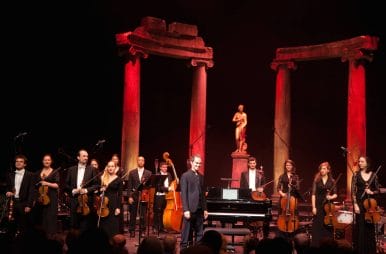
Dec 28, 2016 | Focolare Worldwide, Senza categoria
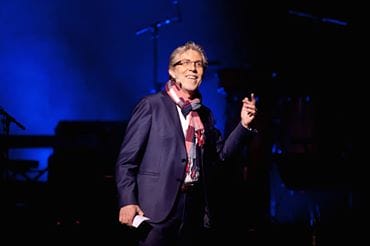
Rocco Femia, Director of the Radici cultural magazine
 Fifty artists performed for free, confirming the strong sympathy is being felt for those who have suffered great loss. Artists included the OCCITANIA Chamber Music Ensemble, with music of Bach; the popular Italian song group, Incanto, which travels around the world with its musical titled ITALIANI, when we were the immigrants; The DALTIN Trio; Vicente and Rafael PRADAL from Spain; flemenco virtuoso guitarist Kiko Ruiz; the NACCARATO Jazz Trio; mandolin player Julien Martineau; the musical poems of the great Faber, performed by the Fabrizio DE ANDRÈ Band; the unforgettable music from the Italian films and the great finale and standing ovation for Cécile LIMAL who led La vita è bella… by Roberto Benigni. The music alternated with lively presentations by Rocco Femia, Director of RADICI magazine and by television journalists Marina Lorenzo and Patrick Noviello. In his thank-you speech, the director of RADICI did not want to forget anyone, conscious of the deep personal commitment of each person to the success of the event: from the technical crew to the artistic director, to the sound director, to the lights. Then there were the Deputy Mayor Francis Grass, the Italian Console to Toulouse, Fabrizio Mazza, the sponsors, benefactors, the media, and so on. Everyone “won the battle” together. And that is what I experienced as I shared a supper with the artists and technical staff after the concert. There is a strong bond among us, comprised of mutual trust, esteem, shared talent and solidarity – and a strong desire to make the world a more beautiful place. And I joyfully realized that this bond also included me and UWP. So, I wouldn’t be surprised if I discover that what I just experienced is only the beginning of a long and beneficial relationship of collaboration. In fact, when presenting the United World Project (UWP) during the concert, Rocco Femia highlighted the slogan of the RImPresa Project, to sum up what everyone seemed to be feeling: Hope vibrates; the future isn’t trembling.” Gustavo Clariá
Fifty artists performed for free, confirming the strong sympathy is being felt for those who have suffered great loss. Artists included the OCCITANIA Chamber Music Ensemble, with music of Bach; the popular Italian song group, Incanto, which travels around the world with its musical titled ITALIANI, when we were the immigrants; The DALTIN Trio; Vicente and Rafael PRADAL from Spain; flemenco virtuoso guitarist Kiko Ruiz; the NACCARATO Jazz Trio; mandolin player Julien Martineau; the musical poems of the great Faber, performed by the Fabrizio DE ANDRÈ Band; the unforgettable music from the Italian films and the great finale and standing ovation for Cécile LIMAL who led La vita è bella… by Roberto Benigni. The music alternated with lively presentations by Rocco Femia, Director of RADICI magazine and by television journalists Marina Lorenzo and Patrick Noviello. In his thank-you speech, the director of RADICI did not want to forget anyone, conscious of the deep personal commitment of each person to the success of the event: from the technical crew to the artistic director, to the sound director, to the lights. Then there were the Deputy Mayor Francis Grass, the Italian Console to Toulouse, Fabrizio Mazza, the sponsors, benefactors, the media, and so on. Everyone “won the battle” together. And that is what I experienced as I shared a supper with the artists and technical staff after the concert. There is a strong bond among us, comprised of mutual trust, esteem, shared talent and solidarity – and a strong desire to make the world a more beautiful place. And I joyfully realized that this bond also included me and UWP. So, I wouldn’t be surprised if I discover that what I just experienced is only the beginning of a long and beneficial relationship of collaboration. In fact, when presenting the United World Project (UWP) during the concert, Rocco Femia highlighted the slogan of the RImPresa Project, to sum up what everyone seemed to be feeling: Hope vibrates; the future isn’t trembling.” Gustavo Clariá
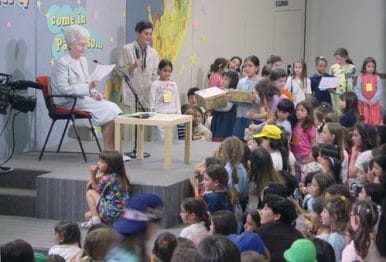
Dec 22, 2016 | Focolare Worldwide
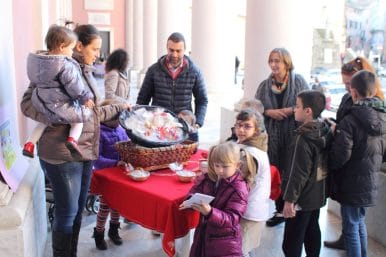 They are the Gen4, the children in the Focolare Movement, explain their idea of Christmas not only as a colourful celebration, filled with enchanting imaginary characters created by persuasive businesses and a frenetic race to sell and buy gifts: We should put Jesus back into the centre of Christmas, it’s his day,” they explain. The Gen4 made the small figurines of the Holy Child with much patience and love and then gave them away to passersby. They report from New York City: “While visiting the city with some friends, in the midst of the crowd, your small table drew my attention … Those words, “They’ve Evicted Jesus” resounded inside me! I’d like to transmit your message to others! This is has been my most beautiful Christmas, you’ve filled my heart with warmth.” Maria Helena Benjamin and Pep Cannoves who are responsible for the Gen4 worldwide, recounted how these little ones are particularly sensitive to evangelical love. They learn to concretize it in their daily actions, real factual gestures of fraternity. They discover that when love is mutual it brings the presence of Jesus among them. Thus they come to know Him and create simple and direct relationship with Him. They manage to involve their friends at school, their families, their parents and their teachers with their disarming simplicity, and they enter into the heart of each one of them.
They are the Gen4, the children in the Focolare Movement, explain their idea of Christmas not only as a colourful celebration, filled with enchanting imaginary characters created by persuasive businesses and a frenetic race to sell and buy gifts: We should put Jesus back into the centre of Christmas, it’s his day,” they explain. The Gen4 made the small figurines of the Holy Child with much patience and love and then gave them away to passersby. They report from New York City: “While visiting the city with some friends, in the midst of the crowd, your small table drew my attention … Those words, “They’ve Evicted Jesus” resounded inside me! I’d like to transmit your message to others! This is has been my most beautiful Christmas, you’ve filled my heart with warmth.” Maria Helena Benjamin and Pep Cannoves who are responsible for the Gen4 worldwide, recounted how these little ones are particularly sensitive to evangelical love. They learn to concretize it in their daily actions, real factual gestures of fraternity. They discover that when love is mutual it brings the presence of Jesus among them. Thus they come to know Him and create simple and direct relationship with Him. They manage to involve their friends at school, their families, their parents and their teachers with their disarming simplicity, and they enter into the heart of each one of them.  Pep Canoves recalled how Chiara Lubich deeply cherished these little ones, giving them a special place in her heart, going to visit them during their international congresses, sending messages to them, answering their questions. And it was to them that she extended the invitation to prevent Jesus from being banished from Christmas: “Let Jesus be born in your midst through your mutual love; then it was always be Christmas! […] We can offer Jesus, Jesus in our midst to the whole world. We can take this love of ours, Jesus in the midst, our joy, into the streets, into the schools, to young and old … anywhere!” The Gen4 also have their Advent Wreath activity. They fill the days before Christmas with many concrete acts of love that are appear simple, but in their smallness are quite revolutionary. The Gen4 are involved in many projects, especially for the most poor. “During the year,” Maria Helena Benjamin continues, “we receive lots of news from around the world about their projects for the marginalized, like the story of five year-old Sonia from Romania who became friends with a Roma girl that had just joined her class.” “We received news from Madagascar and from Indonesia. Also from Syria which these days is in so much trouble and at war… Pep recounts: “From Aleppo they even sent us photos: in these conflict situations we carry on living with them, continuing with them to believe in love.” Once, while answering to a question from one of the Gen4 boys, Chiara had given them a special assignment: “Do you know what real happiness is? It’s the happiness you have when you love. Try it! Whenever you love, you’re happy. If you love all the time, you’ll be happy all the time. What should you do in the world? Give happiness to people, teach everyone to love.” And they really do teach us, with their purity and simplicity, how to put evangelica love into practice, the secret to happiness. Patrizia Mazzola
Pep Canoves recalled how Chiara Lubich deeply cherished these little ones, giving them a special place in her heart, going to visit them during their international congresses, sending messages to them, answering their questions. And it was to them that she extended the invitation to prevent Jesus from being banished from Christmas: “Let Jesus be born in your midst through your mutual love; then it was always be Christmas! […] We can offer Jesus, Jesus in our midst to the whole world. We can take this love of ours, Jesus in the midst, our joy, into the streets, into the schools, to young and old … anywhere!” The Gen4 also have their Advent Wreath activity. They fill the days before Christmas with many concrete acts of love that are appear simple, but in their smallness are quite revolutionary. The Gen4 are involved in many projects, especially for the most poor. “During the year,” Maria Helena Benjamin continues, “we receive lots of news from around the world about their projects for the marginalized, like the story of five year-old Sonia from Romania who became friends with a Roma girl that had just joined her class.” “We received news from Madagascar and from Indonesia. Also from Syria which these days is in so much trouble and at war… Pep recounts: “From Aleppo they even sent us photos: in these conflict situations we carry on living with them, continuing with them to believe in love.” Once, while answering to a question from one of the Gen4 boys, Chiara had given them a special assignment: “Do you know what real happiness is? It’s the happiness you have when you love. Try it! Whenever you love, you’re happy. If you love all the time, you’ll be happy all the time. What should you do in the world? Give happiness to people, teach everyone to love.” And they really do teach us, with their purity and simplicity, how to put evangelica love into practice, the secret to happiness. Patrizia Mazzola

Dec 19, 2016 | Focolare Worldwide
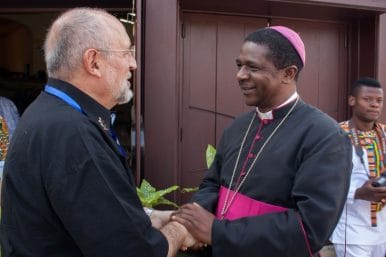 “I was asked to present a report on the Christian witness in front of African tradition. It wasn’t easy for me, for two simple reasons: the first is that I am a Bangwa, the second is that I’m not only Christian, but also the bishop of Mamfe.” The speaker is Bishop Andrew Fuanya Nkea at a symposium on dalogue between traditional African religions and Christianity, during the 50th anniversary celebration of the Focolare Movement in Fontem. Fifty-one years old, he is originally from Widikum, Cameroon, graduate in Philosophy and Theology, a priest since 1992, pastor, secretary of the Diocese, professor and formator, Secretary General of the Catholic University of Cameroon and recently named Bishop of the diocese of Mamfe. “I decided to use a more practical than theoretical approach in my talk,” said the bishop who then proceeded to recount the history of the relationship between the Bangwa culture – especially in the south west region of Cameroon, the Lebialem District – and Christianity. That relationship was marked by an encounter that turned into a sort of parting of the waters between a before and an after: the encounter with the Focolare Movement. Bishop Andrew Fuanya is a living demonstration that it is possible to overcome the dualism between two traditions, without falling into religous syncretism. The Christianity brought by the first missionaries who arrived in Cameroon in the 1920s had placed the population in front of a fork in the road: “Either you become Christian and avoid all aspects of the traditional religions, or you practice the Bangwa religion, remaining a pagan, good only as firewood for hell.” There was little or no dialogue between Christianity and the local culture. Typical musical instruments were banned in church, along with traditional prayers. In spite of the rigidity and inflexible methods used by the first missionaries, many people embraced Christianity, even though it was very difficult and in direct opposition to their communities.
“I was asked to present a report on the Christian witness in front of African tradition. It wasn’t easy for me, for two simple reasons: the first is that I am a Bangwa, the second is that I’m not only Christian, but also the bishop of Mamfe.” The speaker is Bishop Andrew Fuanya Nkea at a symposium on dalogue between traditional African religions and Christianity, during the 50th anniversary celebration of the Focolare Movement in Fontem. Fifty-one years old, he is originally from Widikum, Cameroon, graduate in Philosophy and Theology, a priest since 1992, pastor, secretary of the Diocese, professor and formator, Secretary General of the Catholic University of Cameroon and recently named Bishop of the diocese of Mamfe. “I decided to use a more practical than theoretical approach in my talk,” said the bishop who then proceeded to recount the history of the relationship between the Bangwa culture – especially in the south west region of Cameroon, the Lebialem District – and Christianity. That relationship was marked by an encounter that turned into a sort of parting of the waters between a before and an after: the encounter with the Focolare Movement. Bishop Andrew Fuanya is a living demonstration that it is possible to overcome the dualism between two traditions, without falling into religous syncretism. The Christianity brought by the first missionaries who arrived in Cameroon in the 1920s had placed the population in front of a fork in the road: “Either you become Christian and avoid all aspects of the traditional religions, or you practice the Bangwa religion, remaining a pagan, good only as firewood for hell.” There was little or no dialogue between Christianity and the local culture. Typical musical instruments were banned in church, along with traditional prayers. In spite of the rigidity and inflexible methods used by the first missionaries, many people embraced Christianity, even though it was very difficult and in direct opposition to their communities.  The novelty represented by the first visit of Chiara Lubich to the royal palace of the Fon of Fontem in 1966 can be described with an image used by the Focolare foundress in describing the first spark, the first inspiration of the interreligious dialogue that would later develop: “Suddenly I had the strong impression of God as an enormous sun that embraced everybody with His love – us and them.” A new era had begun, driven on the wind of the Second Vatican Council and by the extraordinary story of the friendship among the first focolarini to reach the spot and the Bangwa people. The focolarini included doctors who had come to wipe out the sleeping sickness that was decimating the population. Since then, the relationship between the faithful of the two religions have been characterized by deep mutual respect which restored dignity to the traditional culture and was a veritable laboratory in which the identity of both religions could grow. The bishop explains: some local religious traditions were kept, such as praying to the dead, so that they might intercede for the family, or the Cry Die, the day dedicated to them; other things were strange to their new faith, such as polygamy, animal sacrifice and witchcraft. The new inculturation, concluded the bishop, according to the spirit of the Second Vatican Council, does not come from an imposition of a rigid uniformity, but is inspired by the values of dialogue and collaboration, in the search for the ‘Seeds of the Word’ that are scattered in every religious tradition. “The challenge for the Christians of Lebialem for the next 50 years will be to recognize that their credibility will depend on how much they are able to love everybody, independant of the religion they belong to.” Only in this way will they be authentic Christians and authentic Africans.” Chiara Favotti Full interview with Mons. Andrew F. Nkea
The novelty represented by the first visit of Chiara Lubich to the royal palace of the Fon of Fontem in 1966 can be described with an image used by the Focolare foundress in describing the first spark, the first inspiration of the interreligious dialogue that would later develop: “Suddenly I had the strong impression of God as an enormous sun that embraced everybody with His love – us and them.” A new era had begun, driven on the wind of the Second Vatican Council and by the extraordinary story of the friendship among the first focolarini to reach the spot and the Bangwa people. The focolarini included doctors who had come to wipe out the sleeping sickness that was decimating the population. Since then, the relationship between the faithful of the two religions have been characterized by deep mutual respect which restored dignity to the traditional culture and was a veritable laboratory in which the identity of both religions could grow. The bishop explains: some local religious traditions were kept, such as praying to the dead, so that they might intercede for the family, or the Cry Die, the day dedicated to them; other things were strange to their new faith, such as polygamy, animal sacrifice and witchcraft. The new inculturation, concluded the bishop, according to the spirit of the Second Vatican Council, does not come from an imposition of a rigid uniformity, but is inspired by the values of dialogue and collaboration, in the search for the ‘Seeds of the Word’ that are scattered in every religious tradition. “The challenge for the Christians of Lebialem for the next 50 years will be to recognize that their credibility will depend on how much they are able to love everybody, independant of the religion they belong to.” Only in this way will they be authentic Christians and authentic Africans.” Chiara Favotti Full interview with Mons. Andrew F. Nkea

Dec 18, 2016 | Focolare Worldwide
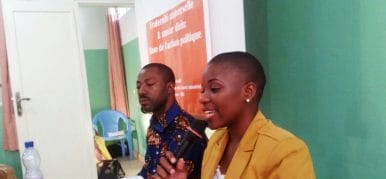 The Democratic Republic of the Congo (DRC) has been passing through a very delicate phase in its politics since last November 14th when the Premier Augustin Matata Ponyo was dismissed, following an accord in October that prolonged the mandate of President Joseph Kabila. Kabila should have terminated his office last December 19th, but his coalition, along with part of the opposition, has decided to continue on until next elections in April 2018. This was the heated context in which the Congolese Political Movement for Unity (PMU), which is inspired by the values of the spirituality of Chiara Lubich, was formed last October 29th. “During this period, the Church and its Bishops Conference is working to avoid chaos in the country,” say Damien Kasereka and Aga Ghislaine Kahambu from the local Focolare Movement. “The launching of the PMU at this moment is really an answer to a need. We’re glad to see members of the Movement more involved in politics, especially the young people who are convinced that things can be different. In spite of everything, we don’t lost hope.” On December 3rd the PMU was officially introduced at the multi-purpose meeting hall of the Moyi Mwa Ntongo Medical Centre in Kinshasa. The Le potentiel newspaper devoted a long article to the event, titled “Love and Brotherhood in Society: the Launch of a Mass-Awareness Movement”. “Far from being a political party, the PMU is a network of reflection and action for the promotion of brotherhood in the political life of the Congo. Its initiators are convinced that universal brotherhood is the basis and the key for positive change in society, especially Congolese [society] whose anti-values are finding it hard to die out,” the newspaper wrote. The event was attended by university researchers, teaching staff, journalists, religious, medical doctors, graduate students, social activists and other professionals. The meeting underscored the importance and opportunity being offered by the PMU in the DRC, since it promotes “doing politics in favour of unity” which is so needed at this difficult moment in time. The National Deputy Dieudonné Upira, one of the initiators of the PMU in the DRC, affirmed: “We’d like to raise a generation of young people who are not afraid like us. Obviously, we have not done much for this country. Perhaps we weren’t trained and this is the reason behind our fear. Therefore, we want to train the young people who are interested in doing good, so that they will be prepared to denounce, announce and renounce. Young people who, in front of the bipolarization of the Congolese political sphere, are able to say: “We must work for our nation.” A young person with training can influence society with his or her way of acting.”
The Democratic Republic of the Congo (DRC) has been passing through a very delicate phase in its politics since last November 14th when the Premier Augustin Matata Ponyo was dismissed, following an accord in October that prolonged the mandate of President Joseph Kabila. Kabila should have terminated his office last December 19th, but his coalition, along with part of the opposition, has decided to continue on until next elections in April 2018. This was the heated context in which the Congolese Political Movement for Unity (PMU), which is inspired by the values of the spirituality of Chiara Lubich, was formed last October 29th. “During this period, the Church and its Bishops Conference is working to avoid chaos in the country,” say Damien Kasereka and Aga Ghislaine Kahambu from the local Focolare Movement. “The launching of the PMU at this moment is really an answer to a need. We’re glad to see members of the Movement more involved in politics, especially the young people who are convinced that things can be different. In spite of everything, we don’t lost hope.” On December 3rd the PMU was officially introduced at the multi-purpose meeting hall of the Moyi Mwa Ntongo Medical Centre in Kinshasa. The Le potentiel newspaper devoted a long article to the event, titled “Love and Brotherhood in Society: the Launch of a Mass-Awareness Movement”. “Far from being a political party, the PMU is a network of reflection and action for the promotion of brotherhood in the political life of the Congo. Its initiators are convinced that universal brotherhood is the basis and the key for positive change in society, especially Congolese [society] whose anti-values are finding it hard to die out,” the newspaper wrote. The event was attended by university researchers, teaching staff, journalists, religious, medical doctors, graduate students, social activists and other professionals. The meeting underscored the importance and opportunity being offered by the PMU in the DRC, since it promotes “doing politics in favour of unity” which is so needed at this difficult moment in time. The National Deputy Dieudonné Upira, one of the initiators of the PMU in the DRC, affirmed: “We’d like to raise a generation of young people who are not afraid like us. Obviously, we have not done much for this country. Perhaps we weren’t trained and this is the reason behind our fear. Therefore, we want to train the young people who are interested in doing good, so that they will be prepared to denounce, announce and renounce. Young people who, in front of the bipolarization of the Congolese political sphere, are able to say: “We must work for our nation.” A young person with training can influence society with his or her way of acting.”  Ex-Deputy Georgine Madiko, who was among the initiators, also said: “We’ll begin periodic university courses that will allow young people to receive training through modules. [Then,] we’ll spread like a spider web covering the whole country and all the academic fields. This spider web will serve – if not in eradicating – at least in mitigating the wrong in our society and in promoting the good.” It will begin with a group of 59 people. At the conclusion, Aga Ghislaine Kahambu thanked everyone: “Your presence shows that you want our country to change. You don’t need a crowd to change society. Each one of us can perform positive actions. Now, we no longer want these actions to be isolated.” Gustavo Clariá
Ex-Deputy Georgine Madiko, who was among the initiators, also said: “We’ll begin periodic university courses that will allow young people to receive training through modules. [Then,] we’ll spread like a spider web covering the whole country and all the academic fields. This spider web will serve – if not in eradicating – at least in mitigating the wrong in our society and in promoting the good.” It will begin with a group of 59 people. At the conclusion, Aga Ghislaine Kahambu thanked everyone: “Your presence shows that you want our country to change. You don’t need a crowd to change society. Each one of us can perform positive actions. Now, we no longer want these actions to be isolated.” Gustavo Clariá
Dec 17, 2016 | Focolare Worldwide

 f life and thought to be shared throughout the year, at all latitudes. 50 years after its founding, there will be, in 2017 various local events and initiatives in various countries worldwide. A roadmap of life and thought in various phases will highlight the anthropological and universal value of the family in the perspective of “universal brotherhood,” and testify to the richness of social and cultural diversity, together with the ideal of unity concretised in family life. The central event will be held in Loppiano from 10 -12 March 2017. About 800 people from all over the world are expected to attend. The families will immerse themselves fully in the reality of the international town of the Focolare, and bear witness to Chiara’s dream in all the continents. In the morning there will be workshops for adults, youth, teenagers and children, held in collaboration with the parish movement, the gen3 and gen4 centres, the no-profit AFN and AMU. In the afternoon the meeting in the Auditorium will be aired via live streaming and will highlight the experts of family themes, who will be participating in the Cultural Seminar to be held at the Sophia University (10 -11 March 2017). This seminar with its characteristic universal outlook will give rise to the future Study Center on the family, with the objective of enhancing the contribution of the spirituality of unity to the family in the challenges it has to face today. For information: www.famiglienuove.org famiglienuove@dev.focolare.org
f life and thought to be shared throughout the year, at all latitudes. 50 years after its founding, there will be, in 2017 various local events and initiatives in various countries worldwide. A roadmap of life and thought in various phases will highlight the anthropological and universal value of the family in the perspective of “universal brotherhood,” and testify to the richness of social and cultural diversity, together with the ideal of unity concretised in family life. The central event will be held in Loppiano from 10 -12 March 2017. About 800 people from all over the world are expected to attend. The families will immerse themselves fully in the reality of the international town of the Focolare, and bear witness to Chiara’s dream in all the continents. In the morning there will be workshops for adults, youth, teenagers and children, held in collaboration with the parish movement, the gen3 and gen4 centres, the no-profit AFN and AMU. In the afternoon the meeting in the Auditorium will be aired via live streaming and will highlight the experts of family themes, who will be participating in the Cultural Seminar to be held at the Sophia University (10 -11 March 2017). This seminar with its characteristic universal outlook will give rise to the future Study Center on the family, with the objective of enhancing the contribution of the spirituality of unity to the family in the challenges it has to face today. For information: www.famiglienuove.org famiglienuove@dev.focolare.org





 “I was asked to present a report on the Christian witness in front of African tradition. It wasn’t easy for me, for two simple reasons: the first is that I am a Bangwa, the second is that I’m not only Christian, but also the bishop of Mamfe.” The speaker is Bishop Andrew Fuanya Nkea at a symposium on
“I was asked to present a report on the Christian witness in front of African tradition. It wasn’t easy for me, for two simple reasons: the first is that I am a Bangwa, the second is that I’m not only Christian, but also the bishop of Mamfe.” The speaker is Bishop Andrew Fuanya Nkea at a symposium on 
